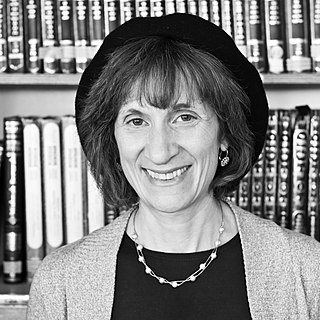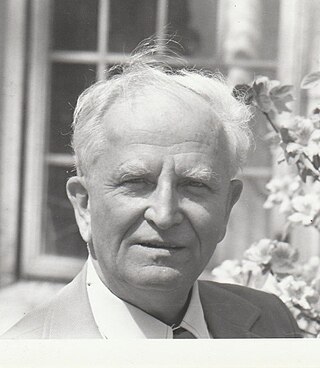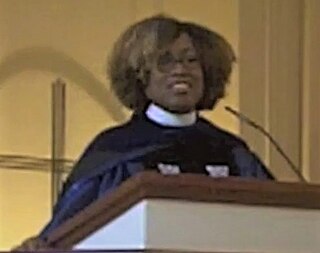Related Research Articles
Feminist theology is a movement found in several religions, including Buddhism, Hinduism, Sikhism, Neopaganism, Baháʼí Faith, Judaism, Islam, Christianity and New Thought, to reconsider the traditions, practices, scriptures, and theologies of those religions from a feminist perspective. Some of the goals of feminist theology include increasing the role of women among clergy and religious authorities, reinterpreting patriarchal (male-dominated) imagery and language about God, determining women's place in relation to career and motherhood, studying images of women in the religions' sacred texts, and matriarchal religion.

Exegesis is a critical explanation or interpretation of a text. The term is traditionally applied to the interpretation of Biblical works. In modern usage, exegesis can involve critical interpretations of virtually any text, including not just religious texts but also philosophy, literature, or virtually any other genre of writing. The phrase Biblical exegesis can be used to distinguish studies of the Bible from other critical textual explanations.
Biblical studies is the academic application of a set of diverse disciplines to the study of the Bible. For its theory and methods, the field draws on disciplines ranging from ancient history, historical criticism, philology, theology, textual criticism, literary criticism, historical backgrounds, mythology, and comparative religion.

Biblical criticism is the use of critical analysis to understand and explain the Bible without appealing to the supernatural. During the eighteenth century, when it began as historical-biblical criticism, it was based on two distinguishing characteristics: (1) the scientific concern to avoid dogma and bias by applying a neutral, non-sectarian, reason-based judgment to the study of the Bible, and (2) the belief that the reconstruction of the historical events behind the texts, as well as the history of how the texts themselves developed, would lead to a correct understanding of the Bible. This sets it apart from earlier, pre-critical methods; from the anti-critical methods of those who oppose criticism-based study; from the post-critical orientation of later scholarship; and from the multiple distinct schools of criticism into which it evolved in the late twentieth and early twenty-first centuries.
Biblical hermeneutics is the study of the principles of interpretation concerning the books of the Bible. It is part of the broader field of hermeneutics, which involves the study of principles of interpretation, both theory and methodology, for all forms of communication, nonverbal and verbal.
Sex is considered repeatedly in the Hebrew Bible. Some references provide unambiguous ethical regulations, such as the laws given in Leviticus or Deuteronomy. Others are more ambivalent, most famously the potentially homosexual actions of Ham with his father, Noah. Its depictions of homosexuality, rape, prostitution and incest have spurred considerable academic and theological attention.
Tikva Simone Frymer-Kensky was a professor at the University of Chicago Divinity School. She received her MA and PhD from Yale University. She had previously served on the faculties of Wayne State University, the Jewish Theological Seminary of America, Yale University, Ben Gurion University, and the Reconstructionist Rabbinical College, where she served as director of Biblical studies.
Gender and Jewish Studies is an emerging subfield at the intersection of gender studies, queer studies, and Jewish studies. Gender studies centers on interdisciplinary research on the phenomenon of gender. It focuses on cultural representations of gender and people's lived experience. Similarly, queer studies focuses on the cultural representations and lived experiences of queer identities to critique hetero-normative values of sex and sexuality. Jewish studies is a field that looks at Jews and Judaism, through such disciplines as history, anthropology, literary studies, linguistics, and sociology. As such, scholars of gender and Jewish studies are considering gender as the basis for understanding historical and contemporary Jewish societies. This field recognizes that much of recorded Jewish history and academic writing is told from the perspective of “the male Jew” and fails to accurately represent the diverse experiences of Jews with non-dominant gender identities.
Elaine Mary Wainwright is a theologian and biblical scholar. Wainwright was Richard Maclaurin Goodfellow Professor in Theology at the University of Auckland until her retirement at the end of 2014. She is known for her feminist scholarship in Matthew's gospel, and work on gender and healing within the Graeco-Roman world. Some of her recent publications are The Bible in/and Popular Culture: A Creative Encounter, Women Healing/Healing Women: the Genderisation of Healing in Early Christianity, and Shall We Look for Another: A Feminist Re-reading of the Matthean Jesus. Wainwright initially studied at the University of Queensland and then obtained a master's degree at Catholic Theological Union in Chicago and a PhD at the École Biblique in Jerusalem.

Judy Klitsner is a contemporary Bible scholar, author and international speaker. She is a senior faculty member of the Pardes Institute for Jewish Studies in Jerusalem, where she has taught Bible and biblical exegesis for more than twenty years.
Daniel Patte is a French-American biblical scholar and author. Patte is, since 2013, professor emeritus of Religious Studies, New Testament and Christianity at Vanderbilt University where he taught from 1971. He studied in both European and American schools: following his Baccalauréat in Philosophy he received a Baccalauréat en Théologie (1960) from the Faculté de Théologie Protestante, Montpellier, France, where he met his wife, Aline Teitelbaum; Licence en Théologie, from the University of Geneva, Switzerland, and a Th.D. (1971) from the Jewish Christian Center at Chicago Theological Seminary. As a biblical scholar and teacher in various settings around the world, Patte calls for an ethics of biblical interpretation that involves acknowledging the contextual character of any interpretation of the Bible, as his numerous books and articles indicate. In the 1970s-1980s Patte pioneered structural criticism in biblical studies, then served two terms (1992–98) as the General Editor of Semeia, an Experimental Journal for Biblical Criticism of the Society of Biblical Literature. Patte initiated and chaired programs of the Society of Biblical Literature, including on Semiotic and Exegesis, Romans Through History and Cultures, and, since 2007, Contextual Biblical Interpretation. With colleagues of the Society of Biblical Literature and of the American Academy of Religion involved in these programs, he envisioned and edited A Global Bible Commentary (2004) and The Cambridge Dictionary of Christianity (2010).
Old Testament theology is the branch of Biblical theology that seeks theological insight within the Old Testament or Hebrew Bible. It explores past and present theological concepts as they pertain to God and God's relationship with creation. While the field started out as a Christian endeavor written mostly by men and aimed to provide an objective knowledge of early revelation, in the twentieth century it became informed by other voices and views, including those of feminist and Jewish scholars, which provided new insights and showed ways that the early work was bound by the perspectives of their authors.
Carol Ann Newsom is an American biblical scholar, historian of ancient Judaism, and literary critic. She is the Charles Howard Candler Professor Emerita of Old Testament at the Candler School of Theology and a former senior fellow at the Center for the Study of Law and Religion at Emory University. She is a leading expert on the Dead Sea Scrolls, Wisdom literature, and the Book of Daniel.

Samuel Lucien Terrien was a French-American Protestant theologian and biblical scholar. A professor at Union Theological Seminary for thirty-six years, he is known for his biblical commentary, particularly for his scholarly contributions to the study of Job and the Psalms in the Old Testament and for his book, The Elusive Presence (1978), in which he presented a new theology of the presence and absence of God written largely in the context of cult, not covenant. It incorporated both Old and New Testaments in a broader ecumenical context and introduced a way for future theologians to ask how the presence of God is experienced by engaging the wisdom traditions to explore how ‘empirical observation can testify to a divine presence in human life just as visionary experiences can.'

The Art of Biblical Narrative is a 1981 book by Robert Alter in which he outlines a literary approach to the Hebrew Bible. He proposes that "the Bible in its final form constitutes an artistic document with a full texture of interconnected unity."
Katharine Doob Sakenfeld is an American Old Testament scholar. She is Professor of Old Testament Literature and Exegesis Emerita at Princeton Theological Seminary, having previously been William Albright Eisenberger Professor of Old Testament Literature and Exegesis.
Gale A. Yee is an American scholar of the Hebrew Bible. Her primary emphases are postcolonial criticism, ideological criticism, and cultural criticism. She applies feminist frameworks to biblical texts. An American of Chinese descent, she has written frequently on biblical interpretation from an Asian American perspective.

Jephthah's daughter, sometimes later referred to as Seila or as Iphis, is a figure in the Hebrew Bible, whose story is recounted in Judges 11. The judge Jephthah had just won a battle over the Ammonites, and vowed he would give the first thing that came out of his house as a burnt offering to God. However, his only child, an unnamed daughter, came out to meet him dancing and playing a tambourine. She encourages Jephthah to fulfill his vow but asks for two months to weep for her virginity. After this period of time, Jephthah fulfilled his vow and offered his daughter.

Wilda C. Gafney, also known as Wil Gafney, is an American biblical scholar and Episcopal priest who is the Right Rev. Sam B. Hulsey Professor of Hebrew Bible at Brite Divinity School of Texas Christian University in Fort Worth, Texas. She is specialist in womanist biblical interpretation, and topics including gender and race.
Karen H. Jobes is an American biblical scholar who is Gerald F. Hawthorne Professor Emerita of New Testament Greek and Exegesis at Wheaton College. She has written a number of books and biblical commentaries. In 2015, she received the Evangelical Christian Publishers Association's Christian Book of the Year Award for "Bible Reference" books. Jobes currently serves as the president of the Evangelical Theological Society.
References
- 1 2 "Dr. Phyllis Trible". National Women's History Museum. Retrieved 2019-11-22.
- ↑ "Crosthwaite: Scandalous Women and Religion". Mount Holyoke College. 2009-02-05. Retrieved 2019-11-22.
- ↑ Tull, Patricia K. (1999). "Chapter 8: Rhetorical Criticism and Intertextuality". In Haynes, Stephen R.; McKenzie, Steven L. (eds.). To each its own meaning : an introduction to biblical criticisms and their applications (Rev. and expanded. ed.). Louisville, Ky.: Westminster John Knox Press. ISBN 978-0664257842.
- 1 2 3 "Finding Aid for Phyllis Trible Papers, 1954-2015" (PDF). Archives of Women in Theological Scholarship The Burke Library Columbia University Libraries Union Theological Seminary, New York. 2016. Retrieved 4 April 2018.
- ↑ Vater, Ann M. (1980). "Review of God and the Rhetoric of Sexuality". Journal of Biblical Literature. 99 (1): 131–133. doi:10.2307/3265712. JSTOR 3265712. S2CID 170804396.
- ↑ "Archives of Women in Theological Scholarship: Phyllis Trible". Burke Library at Union Theological Seminary. Retrieved 4 April 2018.
- ↑ "Phyllis Trible". Jewish Women's Archive. Retrieved 2023-02-07.
- ↑ "History". Wake Forest University School of Diviinity. Archived from the original on 10 January 2012.
- ↑ Brenner, Athalya. "Quo Vadis Domina? Reflections on What We Have Become and Want to Be". Lectio Difficilor. Retrieved 4 August 2013.
- ↑ Collins, John J. (2005). The Bible After Babel: Historical Criticism in a Postmodern Age. Eerdmans. p. 78. ISBN 9780802828927 . Retrieved 31 October 2015.
- 1 2 Dictionary of major biblical interpreters. McKim, Donald K. ([2nd ed., new and expanded ed.] ed.). Downers Grove, Ill.: IVP Academic. 2007. ISBN 978-0-8308-2927-9. OCLC 138340706.
{{cite book}}: CS1 maint: others (link) - 1 2 Milne, Pamela (26 March 1989). "Genesis From Eve's Point of View". The Washington Post. Archived from the original on 21 June 2020. Retrieved 20 November 2019.
- 1 2 3 Roded (2015). "Jewish and Islamic Religious Feminist Exegesis of the Sacred Books: Adam, Woman and Gender". Nashim: A Journal of Jewish Women's Studies & Gender Issues (29): 56–80. doi:10.2979/nashim.29.56. JSTOR 10.2979/nashim.29.56. S2CID 155932131.
- ↑ Collins, John J. (2005-11-15). The Bible After Babel: Historical Criticism in a Postmodern Age. Wm. B. Eerdmans Publishing. ISBN 9780802828927.
- ↑ Vater, Ann M. (1980). "Review of God and the Rhetoric of Sexuality". Journal of Biblical Literature . 99 (1): 131–133. doi:10.2307/3265712. ISSN 0021-9231. JSTOR 3265712. S2CID 170804396.
- 1 2 Carden, Michael (1999-03-01). "Homophobia and Rape in Sodom and Gibeah: A Response to Ken Stone". Journal for the Study of the Old Testament . 24 (82): 83–96. doi:10.1177/030908929902408205. S2CID 142276408.
- ↑ Bergant, Dianne (2013). Genesis: In the Beginning. Collegeville, Minnesota: Liturgical Press. pp. 8–9. ISBN 978-0-8146-8250-0.